Guatemala court intervenes in presidential race, raising concern
The country’s Constitutional Court has suspended its certification of the election results, pending a review of votes.
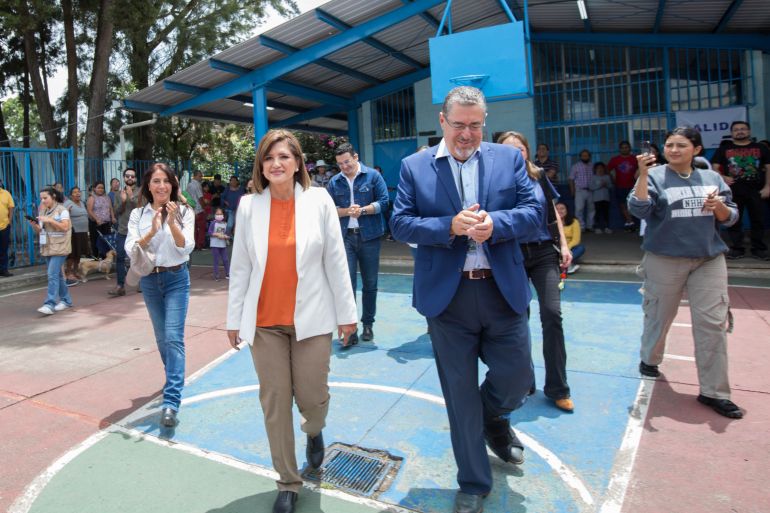
Guatemala City, Guatemala – After an unexpected finish to the first round of Guatemala’s presidential election, the country’s Constitutional Court has suspended its certification of the results, citing complaints from rival political parties.
But the temporary suspension has raised fears the court might overturn the outcome of the vote, threatening Guatemala’s already fragile democracy.
Keep reading
list of 3 itemsGuatemalan court convicts prominent journalist José Rubén Zamora
Guatemala elections: What you need to know
“This is unprecedented,” said Edgar Ortiz, a constitutional lawyer with the Guatemalan think tank Fundación Libertad y Desarrollo.
“Never in history has there been a problem with the vote count, much less one where the Constitutional Court — which has nothing to do with this — has intervened in the system.”
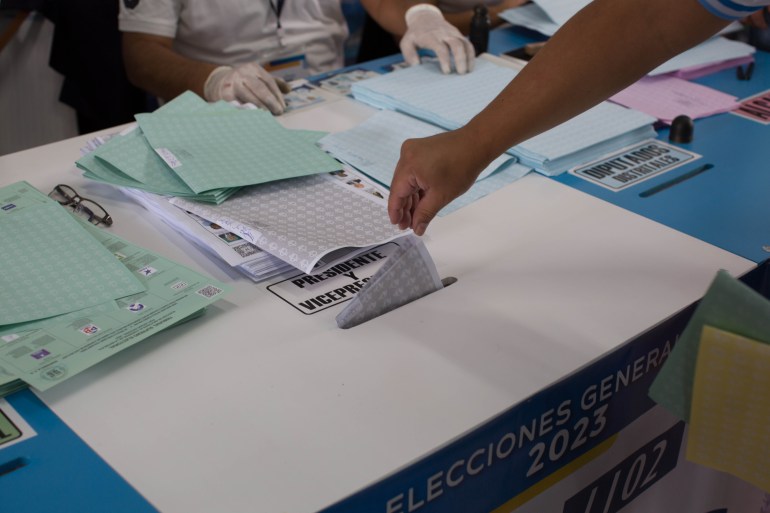
The court’s decision came late on Saturday in the wake of a surprise victory for the progressive Seed Movement.
Its dark-horse candidate Bernardo Arevalo emerged from a crowded field to win one of two seats in the final round of the election, with 11.8 percent of the vote. The only candidate with more votes was conservative Sandra Torres of the National Unity of Hope (UNE) party, with 15.8 percent support.
But Arevalo’s surprise upset provoked complaints from 10 political parties, including the UNE. They argue a “great quantity” of the votes show “inconsistencies, alterations and other discrepancies”.
But according to Oswaldo Samayoa, a constitutional lawyer and professor at San Carlos University, none of the evidence presented by the parties supports their arguments.
“There are around 600 of 24,000 polling stations that have to be reviewed to see if there were any disputes,” Samayoa said. “The parties should have evidence of those disputes, but not one political party presented evidence of such irregularities.”
Nevertheless, the Constitutional Court responded to the complaints with the suspension and a review of the vote tallies, which included congressional and municipal races as well as the presidential one.

Samayoa and Ortiz said they believe the review will not change the final match-up in the presidential contest. But, they warned, it could shift the results in lower-level contests, where the margins for victory were much tighter.
In the mayoral race in Guatemala City, for instance, the incumbent earned only about 500 more votes than his closest competition.
Arevalo’s Seed Movement, meanwhile, has failed to stop the election review. On Sunday, Guatemala’s Supreme Electoral Council denied its request for an annulment of the process.
“It sets a completely negative and disastrous precedent for the rule of law in Guatemala,” Juan Guerrero, the Seed Movement’s national poll observer, told Al Jazeera.
Critics point out that at least six of the parties that issued complaints face cancellation after failing to obtain the minimum number of votes required to remain a legally recognised political party.
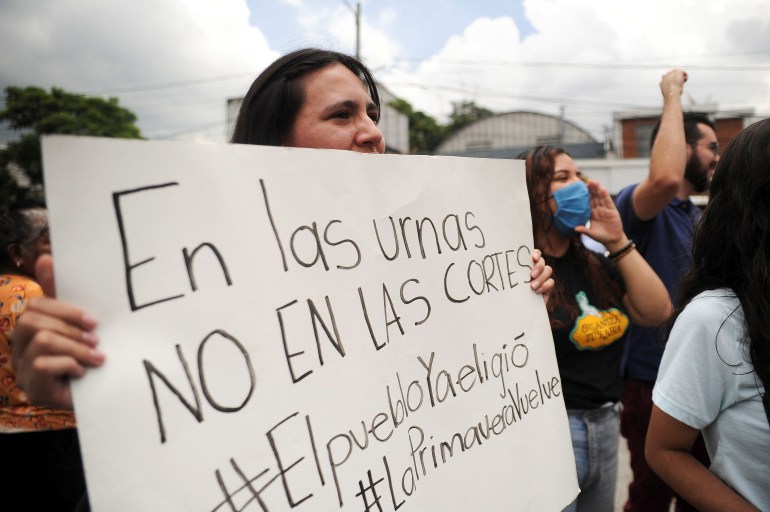
Court’s decision sparks backlash
The pause in the vote certification has prompted a backlash both in Guatemala and from international observers who fear the results could be overruled, shattering faith in the country’s democracy.
On Sunday, United States Secretary of State Antony Blinken issued a statement backing the election results and calling on the Constitutional Court to respect democratic norms.
“The United States supports the Guatemalan people’s constitutional right to elect their leaders via free and fair elections and is deeply concerned by efforts that interfere with the June 25 election result,” the statement said. “Undermining the June 25 election would be a grave threat to democracy with far-reaching implications.”
Also on Sunday, the Organization of American States (OAS) dispatched observers and election experts to attend Guatemala’s election review, to ensure “the will of the people expressed at the polls” is “respected”.
The Guatemalan Foreign Ministry, however, responded to the concerns by calling on foreign governments to respect the country’s sovereignty and not intervene in its domestic affairs.
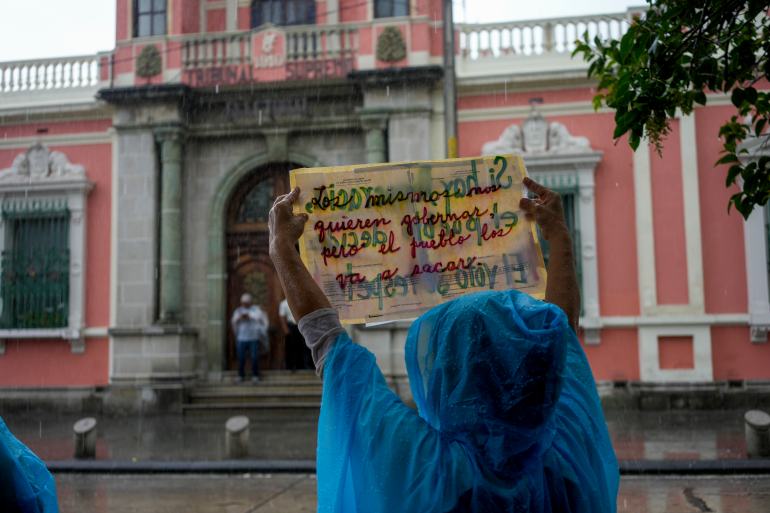
But even within Guatemala’s own borders, the court’s decision sparked outcry and criticism in a race already marred by questions of corruption.
In the lead-up to the first round of voting, three candidates — including a frontrunner in the polls — were disqualified based on errors in their paperwork and other alleged violations of electoral law.
Those decisions, also issued by the Constitutional Court, have undermined some voters’ trust in the electoral system.
In the wake of Saturday’s suspension, some voters took to social media platforms like TikTok to express their frustration, posting copies of the tallies publicly available on election transparency websites run by the government.
Their goal was to show there was no fraud in the June 25 elections.
“I believe that this action of publishing the [tallies] is a way of recovering a bit of the essence of democracy,” said Andrea Rodriguez, a 26-year-old sociologist and former student leader who voted for the Seed Movement and shared her polling station’s results on Instagram.
“It is like a way of making it known to the people around us, like telling our families and our friends that there is no longer a fear of defending the vote.”
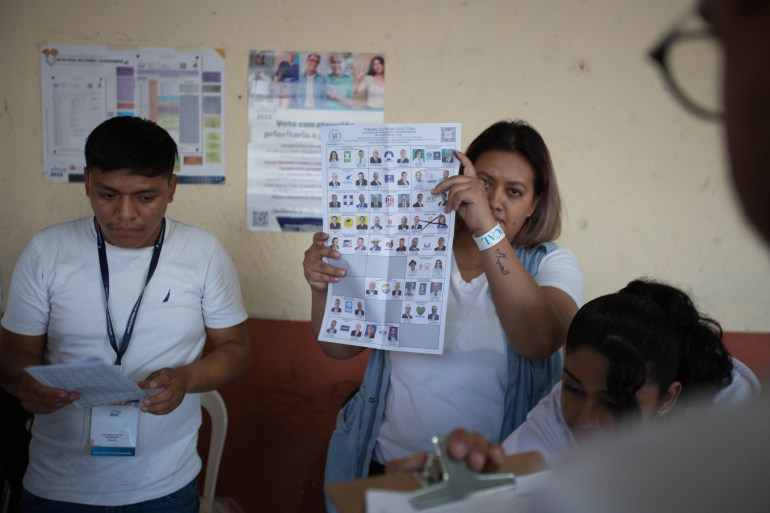
Seed Movement a target for mudslinging
The fate of the second round of the presidential election, scheduled for August 20, remains up in the air for now, as the court completes its review.
Even so, the success of the progressive Seed Movement has made it a target for criticism even beyond the voter tallies.
Opponents have blasted the party as “socialist” and “communist”. Torres, the conservative frontrunner, has also accused her Seed Movement rival Arevalo of threatening to expropriate private property and end religious freedom in favour of an “LGBT ideology”.
She has also sought to portray Arevalo as a “puppet” of foreign governments, tying him to ventures like the International Commission against Impunity in Guatemala (CICIG), a United Nations-backed anti-corruption organisation that was shuttered in 2019.
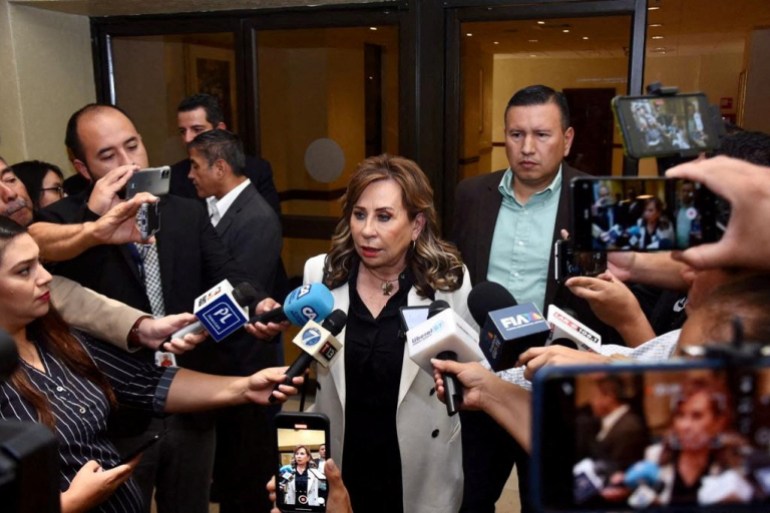
Arevalo, meanwhile, has denied the accusations and framed them as evidence of his platform’s popularity.
“The success of [the Seed Movement] has aroused the fear of the corrupt,” Arevalo said in a press conference days after his June 25 victory.
But Gabriela Carrera, a political science professor at Rafael Landivar University in Guatemala City, told Al Jazeera that Arevalo’s success may ultimately depend on whether he can rise above the accusations.
“The challenge for Seed Movement lies in how it can cushion itself against potential strategies like false narratives and imaginings,” Carrera said.